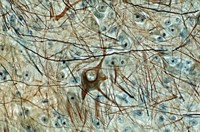Advertisement
Grab your lab coat. Let's get started
Welcome!
Welcome!
Create an account below to get 6 C&EN articles per month, receive newsletters and more - all free.
It seems this is your first time logging in online. Please enter the following information to continue.
As an ACS member you automatically get access to this site. All we need is few more details to create your reading experience.
Not you? Sign in with a different account.
Not you? Sign in with a different account.
ERROR 1
ERROR 1
ERROR 2
ERROR 2
ERROR 2
ERROR 2
ERROR 2
Password and Confirm password must match.
If you have an ACS member number, please enter it here so we can link this account to your membership. (optional)
ERROR 2
ACS values your privacy. By submitting your information, you are gaining access to C&EN and subscribing to our weekly newsletter. We use the information you provide to make your reading experience better, and we will never sell your data to third party members.
Biological Chemistry
Drug Shows Promise For Treating Muscular Dystrophy
Compound might treat other conditions caused by "nonsense" mutations
by Sophie L. Rovner
April 25, 2007
"Nonsense" genetic mutations, which result in shorter-than-normal proteins, cause 5???70% of cases of inherited disorders, including muscular dystrophy, cystic fibrosis, and cancer. A small molecule now in Phase II clinical trials might be capable of treating several of these types of cases.
This treatment strategy???targeting a group of disease cases caused by one class of mutation rather than targeting individual diseases???represents a "paradigm shift," according to Stuart W. Peltz, president and CEO of PTC Therapeutics, in South Plainfield, N.J. This biopharmaceutical firm discovered the compound via high-throughput screening.
A nonsense mutation in DNA introduces a code for a stop codon rather than for an amino acid. When the DNA is transcribed into messenger RNA (mRNA), this misplaced stop codon???also known as a premature termination codon (PTC)???halts translation of the mRNA into a protein by a ribosome. The resulting truncated protein can cause disease. Some cases of Duchenne muscular dystrophy, for instance, are caused by nonsense mutations that yield malformed dystrophin, a protein necessary for maintaining the strength of muscle fibers.
PTC Therapeutics wants to treat this fatal muscle-wasting disease with the small molecule it calls PTC124. Peltz, University of Pennsylvania physiologist H. Lee Sweeney, and colleagues report that the oral drug binds to ribosomes and allows them to bypass the mRNA site that interrupts dystrophin production. In a mouse model of the disease, the ribosomes then churn out normal, full-length dystrophin, thereby restoring muscle function (Nature, DOI: 10.1038/nature05756). PTC Therapeutics is now testing the compound's efficacy in patients with Duchenne muscular dystrophy and cystic fibrosis.
In a commentary in Nature, Anton Schmitz and Michael Famulok of the University of Bonn, in Germany, point out PTC124's "astonishing" selectivity for PTCs. The compound enables a ribosome to distinguish between a premature stop codon and a normal stop codon that indicates where protein production should properly cease. The antibiotic gentamycin also allows ribosomes to ignore PTCs, but its severe side effects and intravenous delivery method have limited its use. Furthermore, unlike PTC124, gentamycin increases the risk of producing mutated proteins.






Join the conversation
Contact the reporter
Submit a Letter to the Editor for publication
Engage with us on Twitter